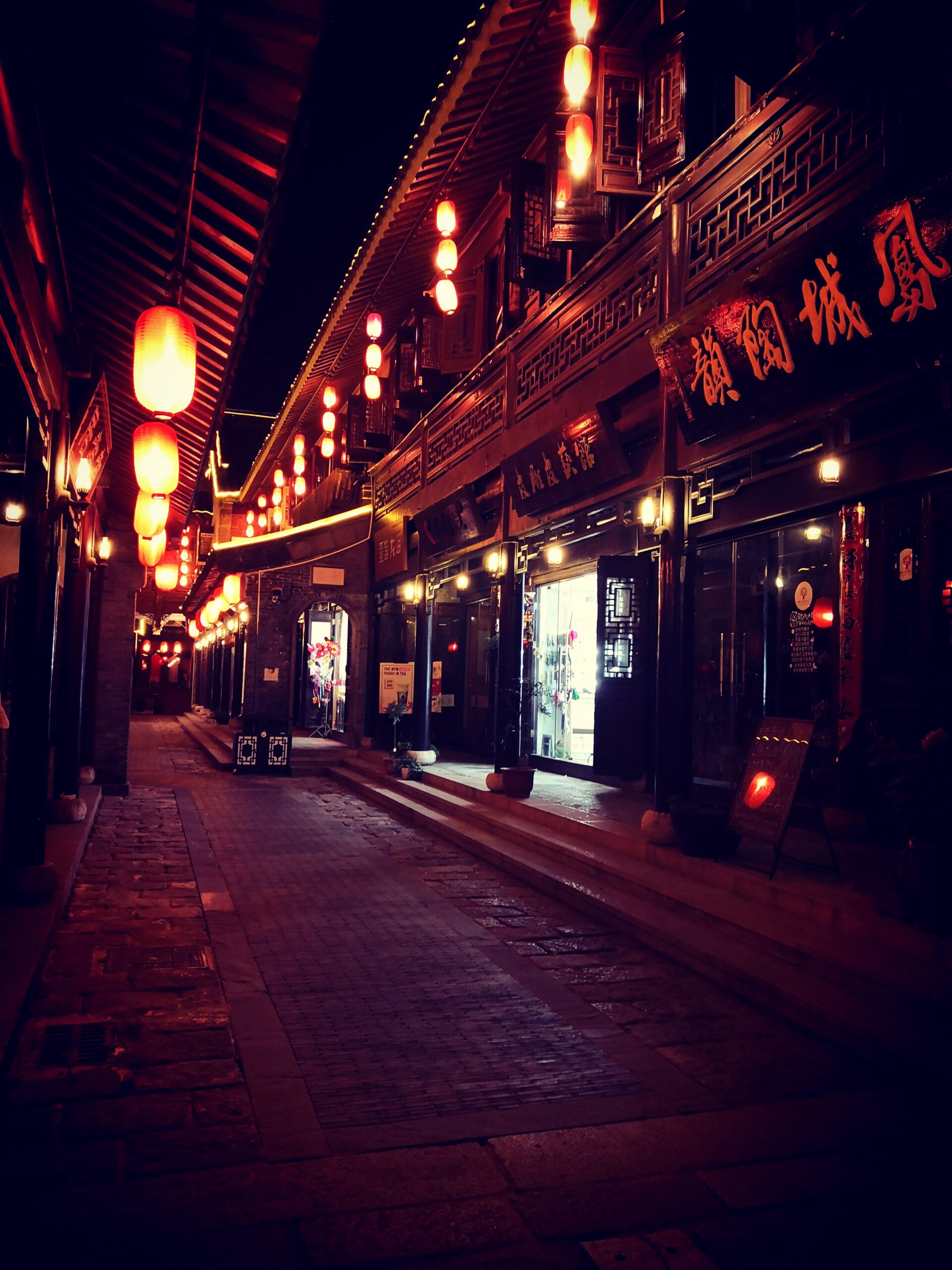From Self to “Gendered Self”: Women’s Tragedy Under Patriarchy as Depicted in Raise the Red Lantern

Image credit: Lanterns, by Ran You
Ella Zhang
Read the Faculty Introduction.
Check out the Research Essay Drafting Model based off Ella Zhang’s “Gendered Self” essay for eight elements that were revised from the draft to the finished essay below.
The first decades of the twentieth century in China, marked by the New Culture Movement and the May Fourth Movement, witnessed a process of national invention and significant changes to a society led by intellectuals. Along with this reformation, a debate about women’s liberation and a new gender ideology was brought to the table. On one hand, as Sarah Steven writes in “Figuring Modernity: The New Woman and the Modern Girl in Republican China,” “Social conservatives supported a cultural ideal of womanhood that accorded with the more traditional ideology of liangqi xianmu (good wife, wise mother)” (82). On the other hand, during that period, another group of women – China’s modern young women who sought to find their subjectivity and independence – emerged. This tension between expressing women’s true selves and conforming to social norms is vividly represented in many Chinese novels, journals, and films. For example, the protagonist Miss Sophia in Ling Ding’s 1927 Miss Sophia’s Diary is a “quintessentially modern woman struggling between self-loathing and self-love, between traditional expectations and modern freedom” (Steven 93). Similarly, The Ladies’ Journal (Funü Zazhi) of the same time presented an image of the “new woman” that incorporated both traditional virtues of motherhood and progressive notions of education (Steven 93).
Among all these critical novels and films representing China’s 1920s gender issues, Raise the Red Lantern, directed by Zhang Yimou, has attracted great attention. This film not only successfully depicts women’s oppression under the feudal family system of polygamy and patriarchy but also vividly reveals the issue of gender relations and women’s identity, both of which deserve our reflection even today. The leading character, 19-year-old Songlian, is a modern girl who has attended one year of college but has had to give up her education to marry a wealthy man as his fourth concubine. Trapped in this household, Songlian is unavoidably controlled by patriarchal traditions that ultimately cause her to lose her sense of self— the free and natural expression of her identity without constraints. Instead, she takes on a new identity as the “woman” that her society wants and forces her to become. This increasingly artificial “woman” identity resonates with what Judith Butler calls the “gendered self” in her essay “Performance Acts and Gender Constitution” (519). For, based on Butler’s interpretation, this “gendered self” is more a cultural construction than a natural existence.
Because Butler sees gender as fluid, however–i.e. changeable, reactive to pressures, influences, contexts, history–she refuses the idea of an “abiding” self. From a psychological perspective, however, most of us do tend to feel and experience a sense of an individual self. Indeed, some sense of “self” is critical to survival. Let us call that psychological function the “true” self, i.e. the sense of one’s individual life as different and distinct from others’. Despite their differences in cultural background and language expression, both Zhang’s movie and Butler’s theory shed light on the tension between the constructed “gendered self” and a woman’s sense of this true inner self, with each corroborating the other’s view on the “woman” identity. Women’s adoption of the “gendered self” and the loss of their sense of inner true self, of their core identity, is a parallel process that causes women to agonize over the splitting of these two identities. Butler’s theory regarding the “gendered self” valuably demonstrates this painful tension existing at three levels: the body, behaviors, and the sense of self.
Before interrogating the cultural construction of the “gendered self,” it is important to define more specifically what the “gendered self” is and where it originates. At the fundamental level of the body, the “gendered self” of a woman arises from men’s objectification of her body and the construction of her identity as a sexual being. In Raise the Red Lantern, to maintain absolute power within his patriarchal society, Master Chen deliberately disparages his concubines by constructing their identities as inessential objects inferior to his identity as the superior subject. To achieve this purpose, he reduces women to sexual properties owned or consumed by him or men in general. For example, for her first night of marriage, Songlian is dressed up in a chamber full of sensual red lanterns, waiting for Master Chen’s arrival (00:11:01- 00:11:50). Chinese Cinema scholar Hsiu-Chuang Deppman interprets this particular scene in the following way:
The pattern of her colorful wedding gown, as we discover later, corresponds to the pattern of the bed frame and thus confirms the structural bondage between her body and the Chen property…Chen’s commentary, commingled with his (and the camera’s) sexualizing gaze, reveals a strong satisfaction with his ownership and a narcissistic pride in his taste. (134)
Deppman insightfully points out the close connection between Songlian’s wedding chamber and other pieces of property that Master Chen owns. Furthermore, the pleasure Chen manifests, as Deppman states, confirms his ownership of Songlian. Indeed, Master Chen’s long and silent gaze towards Songlian vividly reveals his objectification of her body. His gaze is a scan, a superficial examination of Songlian’s beauty as a sexual being with no discovery of any other inner beauty such as her dynamism, her mind, or her soul. For him, Songlian is only another commodity to satisfy his sexual desire, one coming on the heels of his second and third concubines who do not bring enough excitement to the Master. As a commodity, Songlian’s recognized identity is nothing other than that associated with her body and determined solely by the Master. Hence, Raise the Red Lantern demonstrates that in a patriarchal society, the “gendered self” of a woman originally arises from men’s objectification of the female body, reducing her to a sexual being.
Parallel to the rise of her “gendered self” as a sexual being in terms of the body, when her body is out of her hands and controlled by Master Chen, Songlian’s core identity —her authentic identity as a young college student— fades away. Perceived as a sexual object, Songlian’s body not only has the physical value to satisfy the Master’s desire but also serves as a means for him to devalue and oppress her sense of identity. For when Songlian submits her body to patriarchal power, she is symbolically giving up the power of her original identity and surrendering to the woman’s role constructed by the Master. When Songlian is left alone after her first night in Chen’s household, she looks at her reflection in the mirror carefully and helplessly, two lines of tears flowing down (00:15:10-00:16:04). Zhang uses the mirror as a metaphor to demonstrate Songlian revisiting and reflecting on her identity. When Songlian looks into the mirror, she genuinely realizes she–it– has already changed. Her reflection in this mirror may be the same as that beautiful woman when she just arrived, but her inner soul has become an imprisoned woman who has lost control over her own body. She is alienated from her original youthful, free-minded self because all the characteristics that identify her authentic self have collapsed. Songlian’s experience emphasizes that without control over her body both physically and figuratively, a woman’s true self becomes damaged and reduced.
From the objectification of Songlian’s body in the abstract to the further construction of her “gendered self,” Chen’s household takes heavy control over Songlian’s behaviors through concrete social norms that are historically constituted and socially shared. For instance, at the very beginning of Raise the Red Lantern, we see Songlian as an independent female figure who walks on her own to Master Chen’s compound instead of taking his sedan chair; moreover, she carries her suitcase without any help from the housekeeper (00:02:25-00:04:50). Afterward, as soon as she arrives at Chen’s, there is a huge wall full of large characters of Chinese classics behind her, an “image symbolically convey[ing] how she [has] married into a system of rules, orders, signs, and conventions” (Deppman 144). Indeed, upon Songlian’s arrival, the housekeeper speaks about Chen’s “customs of generations,” which implicitly instills a sense of obedience and submission in her mind. In a patriarchal society, as Butler describes, “to be a woman is to have become a woman, to compel the body to conform to a historical idea of ‘woman,’ to induce the body to become a cultural sign, to materialize oneself in obedience to a historically delimited possibility” (522). This condition means a female is not qualified to be a “woman” until she complies with all her culture’s historical ideas of “woman.” Yet this historical identity, according to Butler, is only an “illusion of an abiding gendered self” or a “gender fiction” fabricated by a patriarchal society (519-22). Moreover, because “those who fail to do their gender right are regularly punished,” women’s obedience becomes their tacit collective agreement to subordination (522-25). So, to avoid punishment for not conforming to social norms, Songlian has to follow the action codes and discipline that echo and reinforce the “gendered self.” Doing her gender right enables Songlian to blend into the culture around her so that she can survive in Chen’s household and the patriarchal society she is living in, where survival is now more cultural and psychological than physical.
Because women have to take on certain “gendered acts” to conform their behavior to social expectations, as described by Butler, the natural expressions of their identities may be concealed and weakened, a diminishment reflected in Songlian’s experience. The Chen household’s patriarchal norms force her to give up her previous expression of identity and start performing as an appropriate “woman” and concubine in Chen’s household. For instance, initially Songlian disapproves of the rule that the wife/concubine currently in the master’s favor chooses the household’s meals, and even leaves the table in anger when the Third Concubine intentionally orders meat only for herself (00:43:55-00:00:44:23). However, when Songlian gains Master Chen’s favor afterwards, she domineeringly demands that her meals be brought to her room, keeping the other concubines waiting (00:53:45-00:54:21). Songlian’s switch from breaking the family’s codified traditions to advocating for those rules, and their underlying power, demonstrates her transition from an independent and unconstricted core identity to the “gendered self.” In short, she loses the ability to express her authentic self as she takes on performative acts. Admittedly, one might argue that her behavior is an act of agency and that she intentionally controls her behavior to get ahead in her oppressive patriarchal world. However, this agency is by no means a natural expression of her true identity. Rather, her actions are most often artificially passive responses to show the feudal household that she has conformed to its cultural standards. Only in this way can Songlian survive at once physically, culturally, and psychologically under the household’s pervasive patriarchal power. The price, however, ultimately lies in her loss of control over her actions and behavior and in the abandonment of her sense of self.
Apart from behavior constraints, at the level of self-awareness, the woman’s “gendered self” increasingly diminishes consciousness of its constructed identity, which makes the “gendered self” self-fulfilling and self-perpetuating. When Songlian finds out that her maid, Yaner, has lit red lanterns secretly in her room, unacceptable given Yaner’s low status, Songlian exposes Yaner’s misconduct in front of everyone. She keeps saying “does this family have rules or not” and, when trying to justify the harsh punishment she imposes on Yaner, asserts that “this is one of the rules of Chen’s” (1:28:11-1:29:37). Songlian’s spontaneous quoting of “the rules of Chen” shows that the Chens’ feudal code of family traditions is now deeply rooted in her mind: she has rationalized, internalized, and now applies those “rules” automatically, without deliberate thought. As Butler explains: “subjective experience is not only structured by existing political arrangements, but effects and structures those arrangements in turn” (522). Butler’s words illuminate that the rise of women’s “gendered self” is a mutual process between women and patriarchal society. On one hand, since the “gendered self” is historically instituted and socially shared, women internalize this compelling identity, so it becomes “natural” for them to conform to the idea of the pseudo-self. On the other hand, when a woman starts performing her gender identity in wider society, she in turn reinforces the system. So the “gendered self” is dependent not only on the external construction of women’s identity but also on women’s reproduction of that identity, which again gives birth to the constructed “gendered self,” making it self-perpetuating.
Yet over time a woman’s increasing adoption of her “gendered self” gradually represses her consciousness of her true self, its individuality and power, a shift seen in Songlian’s experience. Deppman describes Songlian when she first arrives at Chen’s household as follows: “She brings into this conservative family a youthful, rebellious energy and an inquisitive sensitivity to the conflicts between modernity and tradition, young and old” (128). Even though the rebellious energy mentioned by Deppman is not explicitly expressed by Songlian, Zhang Yimou demonstrates Songlian’s resistance subtly through her behavior. For instance, initially Songlian questions the “customs for generations” and disobeys the rules; also, she bravely despises the Third Mistress for her aggression in earning Master Chen’s favor. However, trapped in the patriarchal and hierarchical Chen family for so long, she eventually becomes desperate and cries out, “what do people amount to in this house? They are like dogs, cats or rats. But certainly not people” (1:35:38-1:35:50). Now going as far as to compare her life to that of an animal, Songlian directly condemns the repression of her personality and human individuality. Indeed, her life has become a near empty shell. British psychoanalyst Dr. Donald Winnicott describes feelings associated with people’s identities as follows: the true self refers to a sense of self based on authentic experience, one that brings a feeling of being alive (Winnicott 161). In contrast, the false self is a defensive façade marked by repressed actions that bring about empty feelings (Winnicott 162). Winnicott’s theory makes perfect sense in Songlian’s case – the young and independent girl is the true self that causes her inner drives to confront the feudal gender norms while the “gendered self” is her artificial self passively taken on, which brings feelings of emptiness. Winnicott also claims that due to the inconsistency between the two “selves,” or in his words, “ego distortion,” people can become torn up and suffer from dissociation (144). That is exactly what happens to Songlian: she suffers from an identity distortion between her true self and constructed gendered self. Eventually, she no longer knows how to naturally express her core identity, or even whether she has one at all, which makes her feel powerless and hopeless. When the rebellious power inherent to her original identity is so undermined by the Chen patriarchy, Songlian’s sense of self collapses thoroughly. This occurs at the end of Raise the Red Lantern, when Songlian becomes insane, putting on the school clothes that she wore when entering Chen’s household and wandering in Chen’s courtyard. Through these actions she escapes the “woman” identity that the Chen household and Chinese feudal society have cruelly put on her. She desires to go back and piece together her shattered true identity, but she cannot, both physically and mentally, which is tragic and desperate.
At this point, patriarchal society as presented in Raise the Red Lantern has fully constructed Songlian’s “gendered self,” while Songlian, on the other hand, has completely lost her inner self in terms of body, behavior, and conscious self-possession. The fading of the core identity always corresponds to and is interwoven with the rise of the constructed self. Over the process, Songlian’s body and behaviors have gradually become consumed by her “gendered self”; even more desperately, she cannot consciously tell whether she is performing the “gendered self” or not. Butler compares theater and life to illustrate the relevance of the awareness of performative acts. She says that in the theater one can say, “this is just an act,” and de-realize the act, making acting into something quite distinct from what is real (Butler 527). However, when people are on the street or in the bus, there is no presumption that the act is distinct from reality (527). Immersed in Chen’s household and feudal society for so long, smart and sober as she is, Songlian inevitably takes on the required performative acts and subconsciously conforms to the prevailing gender norms. She gradually internalizes as reality the Chens’ feudal codes of tradition that she previously hated, reproducing their reality. Once the family politics of the “gendered self” sneak into Songlian’s life, ultimately, it is near-impossible for her to escape the tragic consequences.
At this point, patriarchal society as presented in Raise the Red Lantern has fully constructed Songlian’s “gendered self,” while Songlian, on the other hand, has completely lost her inner self in terms of body, behavior, and conscious self-possession. The fading of the core identity always corresponds to and is interwoven with the rise of the constructed self. Over the process, Songlian’s body and behaviors have gradually become consumed by her “gendered self”; even more desperately, she cannot consciously tell whether she is performing the “gendered self” or not. Butler compares theater and life to illustrate the relevance of the awareness of performative acts. She says that in the theater one can say, “this is just an act,” and de-realize the act, making acting into something quite distinct from what is real (Butler 527). However, when people are on the street or in the bus, there is no presumption that the act is distinct from reality (527). Immersed in Chen’s household and feudal society for so long, smart and sober as she is, Songlian inevitably takes on the required performative acts and subconsciously conforms to the prevailing gender norms. She gradually internalizes as reality the Chens’ feudal codes of tradition that she previously hated, reproducing their reality. Once the family politics of the “gendered self” sneak into Songlian’s life, ultimately, it is near-impossible for her to escape the tragic consequences.
One might argue that if women proactively accept and adopt the “gendered self,” they will avoid the distortion that occurs with their true self. However, to truly survive both physically and mentally, women must keep a sense of their true selves from submission to the socially and culturally compelling gender identity. The fate of Tzu-chun in Lu Xun’s Regret for the Past, which is set in the same period as Raise the Red Lantern, illustrates this idea perfectly. Initially, Tzu-chun says to her lover firmly and gravely: “I’m my own mistress. None of them [her family members] has any right to interfere with me,” which shows she is such a courageous and rebellious girl (Lu 198). However, Tzu-chun’s consciousness of her independence does not last long. After marrying her lover, Tzu-chun’s mindset becomes deeply influenced by patriarchal ideology. Conforming to feudal norms, she sees motherhood and household management as the primary values of women; she cooks for her family all day long and argues with other women over trivialities (Lu 205-209). Gradually, she loses all her charming spirit and becomes short-sighted and timid, deviating from her original self. In the end, her husband loses interest and breaks up with her, all of which leads to Tzu-chun’s premature death. According to psychotherapist Maria Papadima, the adoption of the external identity does not necessarily ensure people’s survival but causes the true self to become “hidden or temporarily surpassed” (395). This absence of a sense of self ultimately makes trauma and dissociation inevitable (Papadima 386). As we see from Tzu-chun’s fate, she fully accepts and internalizes her “gendered self,” is willing to take on the expected performative acts and conform to social norms. So, even though she seems to own the agency of her behaviors and beliefs, she is controlled by a patriarchal society after all. Without remaining an independent and courageous woman, she loses her husband, who loves her true self, and, more importantly, loses the ultimate power to resist the oppression that society exerts over her.
Songlian and Tzu-chun can be seen as the epitome of all women living in 1920s China, a time when Chinese women finally got their chance to receive a western education and throw off the shackles of the old patriarchal ways of thinking. At that time, the “new women’s” quest for freedom conflicted with their long-term obedience and subordination. Given the historical background, the “new women” were forced by patriarchal customs to take on the prevailing constructed identity as a way to culturally survive. Because these women in 1920s China were of socio-political significance, as cinema scholar Hsiu-Chuang Deppman says in his analysis of Raise the Red Lantern, they “deserve to be watched, understood, and pitied” (148). By exploring the gender relations of that time, as depicted in Songlian’s and Tzu-chun’s tragedies, we see exactly how the loss of the inner self leads to women’s sufferings in a patriarchal society. These stories are cautionary tales that remind every woman that the loss of her core identity is not illusory, and to be fully warned of the consequences of that potential loss. Yes, women need to blend into the given patriarchal society to an extent. But they also need a degree of separation from certain rigid gender roles that are expected and reinforced by society. In this way, women may prevent themselves from assimilation into an inauthentically constructed “gendered self,” protecting themselves from losing their true selves. When women can sustain their true selves as a fully integrated part of their core identity, they retain power. Though that power may be limited, it can prevent the patriarchy from entirely destroying their lives.
Works Cited
Butler, Judith. “Performative Acts and Gender Constitution: An Essay in Phenomenology and Feminist Theory.” Theatre Journal, vol. 40, no. 4, 1988, pp. 519–531. JSTOR, www.jstor.org/stable/3207893. Accessed 5 Oct. 2020.
Da Hong Deng Long Gao Gao Gua: Raise the Red Lantern. Directed by Zhang Yimou, performances by Li Gong. Peking, China: China Film Co-production Corp, 1991.
Deppman, Hsiu-Chuang. “Body, Space, and Power: Reading the Cultural Images of Concubines in the Works of Su Tong and Zhang Yimou.” Modern Chinese Literature and Culture, vol. 15, no. 2, 2003, pp. 121–153. JSTOR, www.jstor.org/stable/41490906. Accessed 29 Nov. 2020.
Lu, Xun. Selected Stories of Lu Hsun. Translated by Xianyi Yang and Gladys Yang. New York, Norton, 2003.
Papadima, Maria. “Dissociation, the True Self and the Notion of the Frozen Baby.” Psychodynamic Practice, vol. 12, no. 4, Nov. 2006, pp. 385–402. EBSCOhost, doi:10.1080/14753630600958189.
Stevens, Sarah E. “Figuring Modernity: The New Woman and the Modern Girl in Republican China.” NWSA Journal, vol. 15, no. 3, The Johns Hopkins University Press, 2003, pp. 82–103, http://www.jstor.org/stable/4317011.
Winnicott, Donald W. “Ego Distortion in Terms of True and False Self.” The Collected Works of D. W. Winnicott: Volume 6, 1960-1963. New York, NY: Oxford University Press, December, 2016. Oxford Clinical Psychology. Date Accessed 13 Dec. 2020

Image credit: Red Door, by Yiwei Zhao



Recent Comments